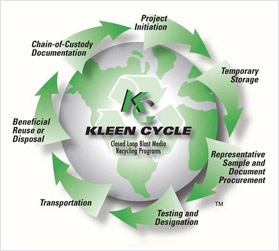About Industrial Waste Recycling
Spent Industrial Materials Beneficial Re-Use and Recycling
Kleen Industrial Services (KIS) specializes in the replacement of virgin raw base feed stocks and materials with those derived from the secondary industrial process, known as Alternate Raw Material (ARM). KIS works with ARM generators and end users, specifically manufacturers of Portland cement, to find long term sustainable relationships.
KIS performs material analysis for reuse potential as ARM for other industrial processes. We work within our customer’s unique corporate recycling guidelines and those of the regulatory environment to provide the most effective and compliant solutions.
KIS manages every aspect of material recycling analysis including regulatory, material compatibility (physical and chemical), transportation and record keeping. Materials currently under management include FCC catalyst fines, Claus catalyst, Selenium sludge, silica, iron, mill scale, alumina, calcium, foundry sand, grinding swarf, abrasive blast media, and filtration media.
Recycled Material Development is evolving rapidly. A complex interconnected network of material supply and demand, technology development, market creation with regulatory change and oversight has emerged from a simpler time. Local and national program development is bound by this growing complexity. Long term viability for materials reuse has grown with fits and starts from early efforts to match materials with end users. Reductions in liability, meeting a higher definition of environmental stewardship, and cost savings are driving long term permanent changes to the way materials flow.
By recycling materials with KIS, they are diverted from our landfills which are a rapidly diminishing resource. They are incorporated into useful materials eliminating liability to the originating firm or others along their path to beneficial reuse. A point in fact, manufacturers of Portland cement are today using thousands of tons of these materials, both new and recycled (from KIS and other sources), to manufacture tomorrow’s roads and concrete structures.By recycling materials with KIS, they are diverted from our landfills which are a rapidly diminishing resource. They are incorporated into useful materials eliminating liability to the originating firm or others along their path to beneficial reuse. A point in fact, manufacturers of Portland cement are today using thousands of tons of these materials, both new and recycled (from KIS and other sources), to manufacture tomorrow’s roads and concrete structures.
In the United States, the Federal and state government environmental regulations must be followed in transporting, receiving and in particular, storage of the spent feed materials. A simple materials tracking system is applied to assure that the allowed storage time is not exceeded. Representative pre-shipment samples are required for evaluation. The samples are analyzed and evaluated to determine compliance with all regulations and compatibility with economical and technical requirements of the process. The customer is then notified as to whether the tested material can be successfully recycled. Upon arrival of the spent materials shipment, the material is compared with the pre-shipment sample before it can be unloaded.
KIS works to keep recycling prices cost competitive compared to landfill disposal. The single most beneficial aspect of KIS Recycling is that our clients and their firms are relieved of the cradle to grave responsibilities of hazardous waste management and exorbitant transportation fees. With the KIS Recycling program, materials can be shipped via standard truck and bill of lading versus licensed hazardous waste transportation. So it is a win-win situation for all concerned.
Regulatory Status of KIS’ Recycling Program
KIS operates our recycling programs under authorities granted by the Federal EPA in their RCRA (Resource Conservation and Recovery Act) regulations, and adaptations in California DTSC (Department of Toxic Substances Control) and DHS (Department of Health Services) regulations. These are generally explained below.
Regulatory Structure
During development of RCRA regulations, the EPA recognized waste streams, that while hazardous in accordance with the definitions they were developing, were at the same time not acutely hazardous materials. Also, the materials were too plentiful and common to be regulated successfully and much of these materials were being routinely reused in industry at that time. Therefore the EPA created some general and specific “Exclusions” in the regulations. These are listed under 40 CFR Section 261.4.
The EPA clearly realized during their rule making that many firms would endeavor to exploit these, so they created criteria that “qualify” the exclusions, being:
- Spent materials must be legitimately recycled to recover minerals.
- Spent materials cannot be accumulated speculatively.
- Until they are recycled, RCRA spent materials must be kept off the ground and not contribute to runoff (so as not to contaminate groundwater).
- Local agencies with authority have a right to audit recycling facilities and shall be allowed free access (all KIS Facilities are registered with local CUPA or other authorities and have passed numerous audits with flying colors).
This federal thinking is incorporated into and expanded on so as to be state specific in California’s Health & Safety Code in section 25143. Within this statute are found the same general requirements as in RCRA along with the following additions:
- Materials shall be labeled as Excluded Recyclable Materials (25143.9).
- Facilities shall be in complete compliance with all local authorities regarding storage and management of these Excluded Recyclable Materials (25143.9).
- Various documentation requirements found in section 25143.10 must be met.
KIS’ Compliance Challenges and Solutions
In California, Oregon and Washington, KIS has secured contracts with the manufacturers and suppliers of Portland cement, asphalt road base and other cementitious products. These firms routinely buy virgin materials identical to those used in other industrial processes such as refineries and petroleum distribution facilities, ship repair facilities, commercial sand blasters, steel manufacturing, etc., that are high in alumina, silica, calcium and iron content.




